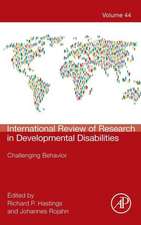Handbook of Intellectual and Developmental Disabilities: Issues in Clinical Child Psychology
Editat de John W. Jacobson, James A. Mulick, Johannes Rojahnen Limba Engleză Paperback – 14 noi 2008
| Toate formatele și edițiile | Preț | Express |
|---|---|---|
| Paperback (1) | 1318.81 lei 6-8 săpt. | |
| Springer Us – 14 noi 2008 | 1318.81 lei 6-8 săpt. | |
| Hardback (1) | 1416.79 lei 6-8 săpt. | |
| Springer Us – 31 oct 2006 | 1416.79 lei 6-8 săpt. |
Din seria Issues in Clinical Child Psychology
- 5%
 Preț: 1346.28 lei
Preț: 1346.28 lei - 5%
 Preț: 372.03 lei
Preț: 372.03 lei - 18%
 Preț: 722.58 lei
Preț: 722.58 lei - 18%
 Preț: 2116.32 lei
Preț: 2116.32 lei - 5%
 Preț: 2144.78 lei
Preț: 2144.78 lei - 18%
 Preț: 1662.70 lei
Preț: 1662.70 lei - 5%
 Preț: 1444.63 lei
Preț: 1444.63 lei - 18%
 Preț: 1831.42 lei
Preț: 1831.42 lei - 5%
 Preț: 1131.72 lei
Preț: 1131.72 lei - 15%
 Preț: 645.79 lei
Preț: 645.79 lei - 5%
 Preț: 1437.86 lei
Preț: 1437.86 lei - 18%
 Preț: 1835.21 lei
Preț: 1835.21 lei - 18%
 Preț: 2105.58 lei
Preț: 2105.58 lei - 5%
 Preț: 1941.84 lei
Preț: 1941.84 lei - 18%
 Preț: 1824.95 lei
Preț: 1824.95 lei - 5%
 Preț: 1343.45 lei
Preț: 1343.45 lei - 18%
 Preț: 1008.91 lei
Preț: 1008.91 lei - 5%
 Preț: 721.19 lei
Preț: 721.19 lei - 5%
 Preț: 1429.44 lei
Preț: 1429.44 lei - 5%
 Preț: 719.59 lei
Preț: 719.59 lei - 15%
 Preț: 647.27 lei
Preț: 647.27 lei - 18%
 Preț: 1234.14 lei
Preț: 1234.14 lei - 18%
 Preț: 1842.16 lei
Preț: 1842.16 lei - 18%
 Preț: 949.42 lei
Preț: 949.42 lei - 5%
 Preț: 1130.43 lei
Preț: 1130.43 lei - 15%
 Preț: 591.29 lei
Preț: 591.29 lei - 18%
 Preț: 1126.52 lei
Preț: 1126.52 lei - 18%
 Preț: 950.52 lei
Preț: 950.52 lei - 18%
 Preț: 1245.84 lei
Preț: 1245.84 lei
Preț: 1318.81 lei
Preț vechi: 1388.23 lei
-5% Nou
252.35€ • 263.47$ • 208.85£
Carte tipărită la comandă
Livrare economică 05-19 aprilie
Specificații
ISBN-10: 0387887148
Pagini: 726
Ilustrații: XX, 726 p. 9 illus.
Dimensiuni: 178 x 254 x 41 mm
Greutate: 1.29 kg
Ediția:2007
Editura: Springer Us
Colecția Springer
Seria Issues in Clinical Child Psychology
Locul publicării:New York, NY, United States
Public țintă
Professional/practitionerCuprins
PART I: FOUNDATIONS.- Epidemiology and Etiology of Mental Retardation.- The Autism Spectrum.- Cerebral palsy.- Epilepsy in People with Mental Retardation.- Pediatric Brain Injury.- Behavioral Effects of Genetic Mental Retardation Disorders.- Social Acceptance and Attitude Change: Fifty Years of Research.- PART II: DISABILITY SERVICES.- Evaluating Developmental Disabilities Services.- Educational Service Interventions and Reforms.- Psychological Services for Older Adults with Intellectual Disabilities.- Residential and Day Services.- Behavioral-Clinical Consultation in the Developmental Disabilities: Contemporary and Emerging Roles.- Advocacy and Litigation in Professional Practice.- PART III: ASSESSMENT AND DIAGNOSIS.- Intellectual Assessment and Intellectual Disability.- Adaptive Behavior.- Psychosocial and Mental Status Assessment.- Functional Behavioral Assessment in Practice: Concepts and Applications.- Psychoeducational Assessment.- Developmental and Behavioral Screening.- Forensic and Psychosexual Assessment.- Family Assessment and Social Support.- PART IV: PREVENTION AND TREATMENT.- Science to Practice in Intellectual Disability: The Role of Empirically Supported Treatments.- Early Intervention: Background, Research Findings, and Future Directions.- The System of Early Intervention for Children with Developmental Disabilities: Current Status and Challenges for the Future.- Stereotypy, Self-injury, and Related Abnormal Repetitive Behaviors.- Psychopathology Among People with Developmental Delays - Assessment and Treatment.- Aggression in Persons with Intellectual Disabilities and Mental Disorders.- Speech and Language Deficits in Children with Developmental Disabilities.- Functional Skills Training for People with Intellectual and Developmental Disabilities.- Social Skills Training for Children with Intellectual Disabilities.- Vocational Skills and Performance.- Sex Offending Behavior.- Pharmacotherapy.- PART V: ETHICAL ISSUES.- Ethical Issues in Clinical Services and Research.- Ethics and Values in Behavioral Perspective.
Recenzii
"This handbook offers a brilliant exploration of the many issues revolving around two populations, those with intellectual disabilities and those with developmental disabilities (who may also have cognitive deficits). … Each contributor is an expert in his or her own discipline, and each essay is grounded in thorough scholarly research (documented in an extensive bibliography). … Summing Up: Highly recommended. Graduate students, researchers, faculty, and professionals." (D. J. Winchester, CHOICE, Vol. 44 (9), May, 2007)
"Handbook of Intellectual and Developmental Disabilities has a substantial goal set for it: to broaden and elaborate on the required knowledge that individuals working with persons with developmental and intellectual disorders require at this time. … As such, this book provides a useful model to follow for clinicians, researchers, and authors in this domain in the coming years. … it proves to be an impressive and informative addition to the clinician’s, student’s, and researcher’s library." (Scott J. Hunter, PsycCRITIQUES, Vol. 53 (22), 2008)
Textul de pe ultima copertă
Changes within the interdisciplinary field of intellectual and developmental disabilities are evolving at a rapid pace. Clinicians, academics, administrators, and a variety of mental health providers alike need easy-to-access, reliable information that enables them to stay abreast of the numerous advances in research, assessment, treatment, and service delivery within a real-world sociopolitical framework. To that end, the Handbook of Intellectual and Developmental Disabilities is an essential resource for any professional who works with this vulnerable population.
This volume examines in detail the numerous advances in the field, summarizing major domains and emerging subspecialties into one eminently useful reference. Its contributors comprise a panel of the leading scientist-clinicians, who offer much-needed insight and guidance into ongoing improvements in theory and practice as well as intervention and prevention. For example, the handbook:
- Opens with chapters that offer a comprehensive review of current definitions, classifications, etiology, and findings on the most prevalent conditions, including cerebral palsy, pediatric brain injury, genetic syndromes, and autism spectrum disorder.
- Provides a survey of psychological and educational service delivery systems available to people with intellectual disabilities – for example, several chapters focus on explaining how agencies work, the politics of service delivery, residential versus day treatment, and program evaluation.
- Offers a wide range of assessment and diagnostic tools and tactics, including cognitive and adaptive behavior assessments, assessing for psychopathology, developmental screening, family assessment, and forensic applications.
- Reviews the latest evidence-based prevention and intervention strategies, from social skills training to self-harm reduction to pharmacotherapy.
- Concludes with insightful chapters on the ethical issues social acceptance and advocacy.
The Handbook of Intellectual and Developmental Disabilities makes clear the far-reaching impact these disorders have on individuals, their families, and society in general. For clinicians, researchers, and advanced-level graduate students, this volume is a must-have resource and reference.
Caracteristici
Examines issues surrounding intellectual and developmental disabilities in a real-world sociopolitical framework
Summarizes the major domains and emerging subspecialties of this vast area into one useful reference
Offers a wide range of practical assessment and diagnostic tools and tactics, including cognitive and adaptive behavior assessments
Reviews the latest evidence-based prevention and intervention strategies, from social skills training to self-harm reduction to pharmacotherapy
Descriere
Changes within the interdisciplinary field of intellectual and developmental disabilities are evolving at a rapid pace. Clinicians, academics, administrators, and a variety of mental health providers alike need easy-to-access, reliable information that enables them to stay abreast of the numerous advances in research, assessment, treatment, and service delivery within a real-world sociopolitical framework. To that end, the Handbook of Intellectual and Developmental Disabilities is an essential resource for any professional who works with this vulnerable population.
This volume examines in detail the numerous advances in the field, summarizing major domains and emerging subspecialties into one eminently useful reference. Its contributors comprise a panel of the leading scientist-clinicians, who offer much-needed insight and guidance into ongoing improvements in theory and practice as well as intervention and prevention. For example, the handbook:
- Opens with chapters that offer a comprehensive review of current definitions, classifications, etiology, and findings on the most prevalent conditions, including cerebral palsy, pediatric brain injury, genetic syndromes, and autism spectrum disorder
- Provides a survey of psychological and educational service delivery systems available to people with intellectual disabilities – for example, several chapters focus on explaining how agencies work, the politics of service delivery, residential versus day treatment, and program evaluation
- Offers a wide range of assessment and diagnostic tools and tactics, including cognitive and adaptive behavior assessments, assessing for psychopathology, developmental screening, family assessment, and forensic applications
- Reviews the latest evidence-based prevention and intervention strategies, from social skills training to self-harm reduction to pharmacotherapy
- Concludes with insightful chapters on the ethical issues social acceptance and advocacy
The Handbook of Intellectual and Developmental Disabilities makes clear the far-reaching impact these disorders have on individuals, their families, and society in general. For clinicians, researchers, and advanced-level graduate students, this volume is a must-have resource and reference.














